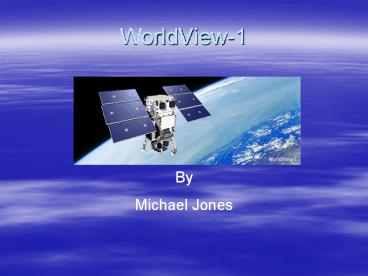WorldView-1
Title:
WorldView-1
Description:
WorldView-1 By Michael Jones Abstract The WorldView-1 satellite is one part of what is to be a three satellite constellation. The group includes QuickBird, WorldView ... –
Number of Views:327
Avg rating:3.0/5.0
Title: WorldView-1
1
WorldView-1
By Michael Jones
2
Abstract
- The WorldView-1 satellite is one part of what is
to be a three satellite constellation. The group
includes QuickBird, WorldView-1 and WorldView-2
(to be launched in later 2008). The ultimate
goal is to have all three systems working
together to provide global visual coverage
commercially at the highest resolution possible
as quickly as possible. Additionally,
WorldView-1 will be providing imagery to the NGS
(National Geospatial-Intelligence Agency). - The WorldView-1 satellite was launched on
September 18, 2007 from Vandenberg AFB, and
carries a panchromatic only instrument that
provides black and white imagery to commercial
and government sources. At nadir it can achieve
a 0.5 meter resolution along with the capability
to image a swath of 17.6 km at a time. This has
led to stunningly detailed imagery that only the
government has had access to previously.
3
Introduction
- Visual imagery provides a birds eye view of
objects and locations as seen by the human eye.
It has many uses including - Visual Assessments (Construction progress,
damages, etc) - Cartography
- Observing Glacial Retreat
- Observing Weather Patterns
- Military Applications
4
Key Concepts
- Sensor band panchromatic
- Sensitive to all visible light but produces a
grayscale image - In depth explanation
- Ground Sample Distance (GSD)
- Pixel size expressed in ground units
- GSD of 0.5 m represents pixel size of 0.5 m X 0.5
m - Swath Width
- The horizontal viewing limit of the Earths
surface in ground units taken in a single pass - Viewing Angle
- Degrees off center of the ground track
- Slew
- Movement of imager horizontally perpendicular to
the ground track
5
Panchromatic
- Unlike traditional black and white images,
panchromatic images are sensitive to all
wavelengths allowing for correct color values in
varying shades of gray. - Click here for more information
6
Panchromatic Sensor
The estimated spectral radiance response,
expressed as output counts per unit radiance as a
function of wavelength, normalized to unity at
the peak response wavelength is shown in figure
1. Source Remember Visible light 400 700 nm
7
- Multispectral (Left Image) Has different
sensors for different colors. Usually lower
spatial resolution (30 m for Landsat 7) - Panchromatic (Right Image) sensors take in all
light from the visible spectrum and usually
display it as a monochromatic (grayscale) image.
Spatial resolution is usually better (15 m for
Landsat 7)
8
- Multispectral Data can be merged with higher
resolution panchromatic luminosity data to
produce a hybrid color image with high
resolution. This process is called
Pan-Sharpening
9
Multispectral image from Landsat 7
Pan-Sharpened image from Landsat 7
10
Key Terms Visualized
48 Inch (122 cm) GSD 24 Inch (61
cm) GSD 6 Inch (15 cm) GSD
Soviet Mig-29 at varying resolutions
Example swath diagram. WorldView-1 has a maximum
viewing angle of /- 45 off nadir to yield a
maximum 1,036 km swath.
11
Dimensions
- 3.6 m tall and 2.5 m across
- 3.2 kW solar array (7.1 m across)
- 2500 kg
12
Orbit
- WorldView-1 has the following orbit
characteristics - Type Sun Synchronous
- Altitude 496 km
- Period 94.6 minutes
- Revisit 5.4 days at 59 cm GSD or less
- 1.7 days at 1 m GSD
- Lifespan 7.25 years
13
Imaging Capabilities
- Resolution of 50 cm at nadir
- 59 cm GSD at 25 off nadir
- Retargeting rate of 4.5 per second
- Acceleration of 2.5 per second²
- Slew time of 10.5 seconds for 300 km
14
Results
- The results of the WorldView-1 satellite system
have been astonishing. - In the following slides you will see 50 cm to 59
cm GSD imagery for - Huston, TX
- Yokohama, Japan
- Ababa, Ethiopia
15
(No Transcript)
16
(No Transcript)
17
(No Transcript)
18
As you can see, visual imagery has come a very
long way
Recovery of a Corona return capsule
Fuzhou Airbase, Fuji
- Most Corona satellites (1959-1972) had a 7.5 m
resolution, while one satellite at a lower
altitude could achieve 1.8 m resolution.
19
Early 1980s Reconnaissance Imagery
20
The Future
- WorldView-2
- Set for launch late 2008.
- Will have 46 cm resolution (Resized to 50 cm for
non U.S. government customers) - Panchromatic and Multispectral
- Faster Targeting and more frequent revisit
21
To View More Visible Imagery
- The Global Land Cover Facility has a large
collection of panchromatic, multispectral and
pan-sharpened imagery of various locations
available to download free from their website - http//glcf.umiacs.umd.edu/index.shtml
22
Sources
- Chevron Remote Sensing Instruments -
Panchromatic. Retrieved April 15, 2008 from
http//www.es.ucsc.edu/hyperwww/chevron/pan.html - Franklin, Rod. WorldView-1 Launch, Half Meter
Imagery Coming Mid-October. Imaging Notes 22.3
(2007) Retrieved April 15, 2008 from
http//www.imagingnotes.com/go/article_free.php?mp
_id109 - Goofing Around With Pan-Sharpening. Free
Geography Tools. Retrieved April 19, 2008 from
http//freegeographytools.com/2007/goofing-around-
with-pan-sharpening - Spectral Response for DigitalGlobe WorldView 1
and WorldView 2 Earth Imaging Instruments.
Retrieved April 11, 2008 from http//www.digitalgl
obe.com/downloads/WV1_WV2_SpectralResponse.pdf - WorldView-1 Data Sheet. Retrieved April 10, 2008
from http//www.digitalglobe.com/file.php/516/Worl
dView-1_Datasheet_web.pdf - WorldView-1 First Images. Retrieved April 8, 2008
from http//www.digitalglobe.com/index.php/197/Wor
ldView-1FirstImages
23
Questions?
- WorldView-1 launch aboard a Delta II rocket from
Vandenberg AFB































